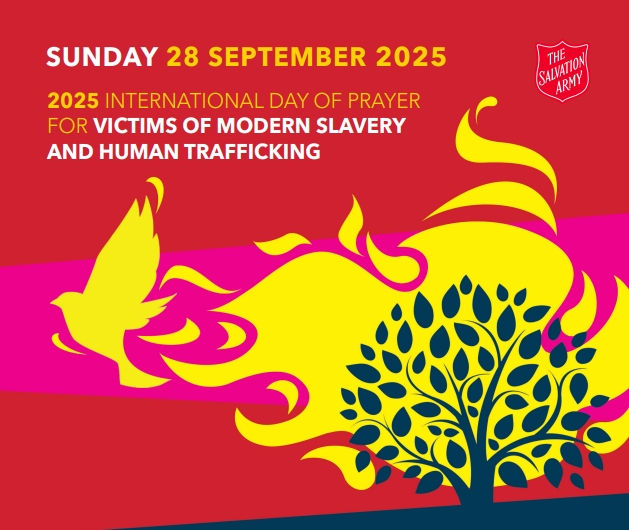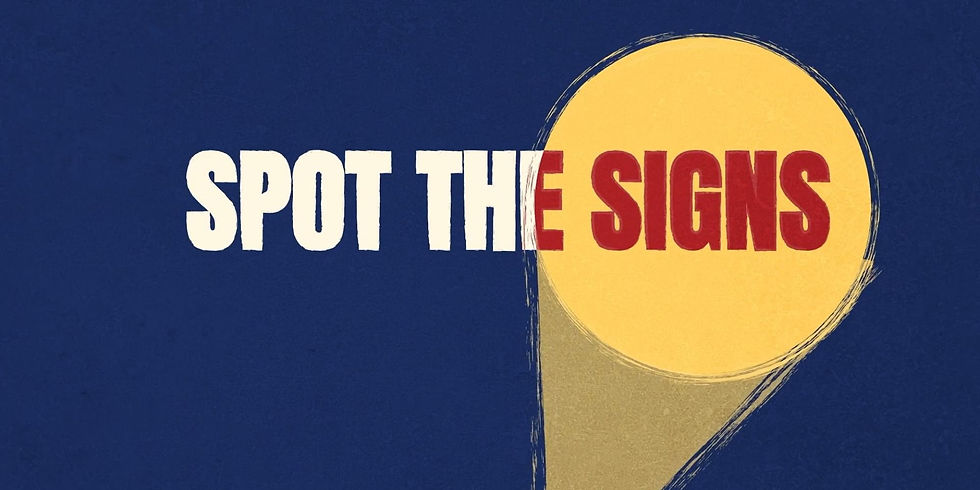General issues global call to prayer
- Sep 25, 2025
- 3 min read
General Lyndon Buckingham has invited the global Salvation Army to join him in prayer on the International Day of Prayer for Victims of Modern Slavery and Human Trafficking this Sunday, 28 September.
“I ask you to join with me in prayers for those held captive as a result of the evils of human trafficking,” The Salvation Army’s world leader said.
To watch the General's video message, click on the main image above.

This year’s theme for the International Day of Prayer for Victims of Modern Slavery and Human Trafficking is ‘Light to Life’, inspired by Exodus 3:2 (NIV): “There the angel of the Lord appeared to him in flames of fire from within the bush. Moses saw that though the bush was on fire, it did not burn up.”
Did you know that 65 million people are enslaved around the world today; 64 per cent are women; and 56 per cent are trafficked for sexual exploitation?
And, did you know that in 2024, The Salvation Army supported 14,552 survivors, ran 12,718 community awareness events, and supported 165,540 people vulnerable to modern slavery and human trafficking?
The Salvation Army is deeply committed to fighting and responding to modern slavery and human trafficking. We have both a theological and historical mandate. Internationally, The Salvation Army's Freedom Action Framework outlines eight response areas, including prayer.
The Salvation Army believes that prayer is foundational and an essential and powerful tool to fight for freedom and work towards a world free from exploitation. By praying together, our hearts are awakened and aligned with God’s desires, and we are empowered to respond to issues in our community with the love of Jesus.
This day of prayer is an opportunity to pray in solidarity with those experiencing or recovering from modern slavery, and to be a part of the transformational work of God.
Resources
The Salvation Army’s International Headquarters (IHQ) has made a range of resources available for download in various languages. These include:
· Sermon guides
· Adult Bible study
· Children and youth resources
· Global prayer guide and prayer station resource
· Poster
For all resources and more information, click here.
Australian contacts
If you would like further support in engaging in this event in your local corps or centre, please contact Major Melanie-Anne Holland (Modern Slavery and Human Trafficking Response Territorial contact person).
The Salvation Army’s Additional Referral Pathway (ARP) is a way for people to access support if they have experienced exploitation known as modern slavery.
No matter what your age, gender, sexuality, ethnicity, culture, religion, or visa status, you have rights and can get help.
If you need help, call the ARP on 1800 000 277.
To report human trafficking or modern slavery in Australia, contact the Australian Federal Police (AFP) on 131 237 or use their online form to make a confidential report.
In cases of immediate danger, dial triple zero (000).

Spot the signs
Driven by poverty, conflict, persecution – and the global demand for cheap goods, labour and sex – modern slavery and human trafficking are thriving worldwide. Yes, even in your own community.
Victims often can’t ask for help. They rely on others – on you – to notice the signs and speak out.
Slavery is very much hidden in plain sight. And when you’re being controlled
and exploited, you rely on other people to spot the signs.
Modern slavery describes situations where someone controls you or takes away your freedom and ability to make choices about your life, to gain profit or benefit. Modern slavery includes trafficking in persons, debt bondage, deceptive recruitment, forced labour, forced marriage, organ trafficking, servitude, sexual servitude and slavery.
Signs that you may be experiencing modern slavery include:
Being forced to work or provide services (in any type of job or industry) under threat or coercion, with little or no pay or under harsh conditions.
Not having control over the work you do, the services you provide or when you can stop working.
Not having control over other parts of your life, for example, when and where you can eat, sleep or rest, or if you can leave the place you are staying when you want to.
Being forced to work to pay off a debt, but the terms of the debt are unclear, or the work never ends.
Being tricked or trapped into work where the nature of the job is not what you were told it would be.
Being recruited or transported through force or deception, for the purpose of exploitation.
Being pressured, forced or tricked into getting married against your will, or getting married when underage.
To download The Salvation Army’s positional statement on modern slavery and human trafficking, click here.
To view the IHQ video Spot the Signs, click on the arrow below.






